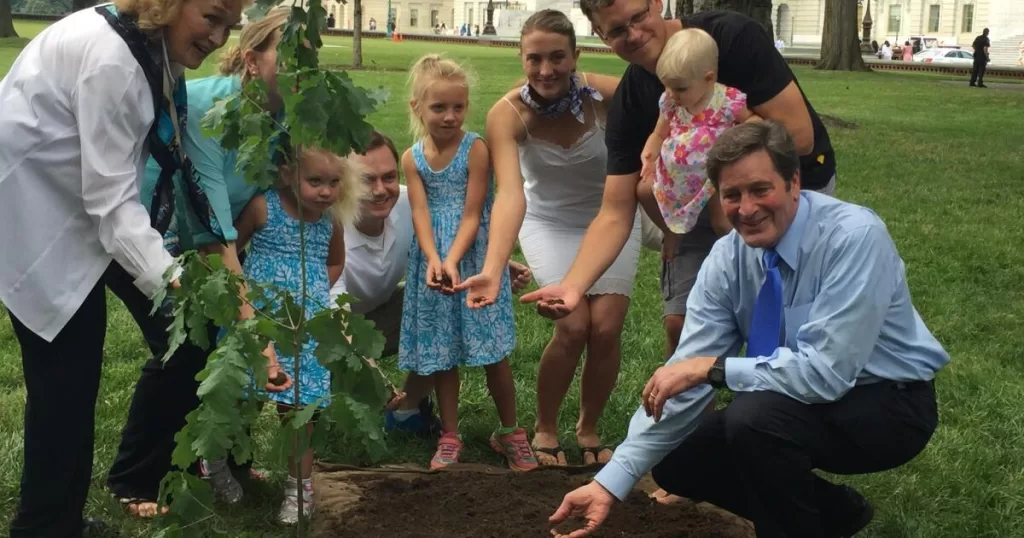Rep. John Garamendi wanted to feel the dirt in his hands as a piece of his Basque heritage was planted on U.S. Capitol grounds Friday.
After pitching a ceremonial shovelful of dirt over the roots of an oak sapling, Garamendi knelt, grasped a handful of dirt and sifted clumped soil through his fingers. Soon the two dozen spectators joined him, covering the roots of the 4-foot tree. Several of his granddaughters helped “Papa” scoop up the dirt.
“The Basque people are connected to the earth, to their place,” Garamendi said. “It’s where the roots are… the earth, the ground, the soil.”
The assembled crowd broke into the Basque anthem when they finished planting the tree, and Garamendi paused an interview to listen.
See the most-read stories this hour »
The sapling is a descendant of Gernikako Arbola, or the Guernica tree, under which Spain’s King Ferdinand and Queen Isabella swore an oath in 1476 pledging to maintain the Basques’ ancient privileges of autonomy. While the Basque Country is still considered part of Spain and France, the tree and its descendants have been a symbol of Basque independence since.
A descendant of the original tree was one of the few things to survive carpet bombing by German and Italian forces in April 1937 during the Spanish Civil War. Pablo Picasso’s Guernica painting represents the bombing.
Garamendi’s voice broke as he spoke of family who died in the bombing.
“This is a very, very special moment for all of us,” he said of the planting.
Unai Rementeria, premier of the Basque Historical Territory of Bizkaia, said Basque leaders still swear an oath under the most recent iteration of the historic tree.
He made a similar oath Friday under the tree’s newest generation, which came from a descendant of the Guernica tree planted at the Basque Museum and Cultural Center in Boise, Idaho.
“An oak tree will take root here,” he said. “Starting today, this is a sacred place in Washington.”
Garamendi’s grandparents immigrated to the United States a few years apart in the early 1900s. Neither intended to look back, but his grandfather eventually returned to the Basque Country with Garamendi’s father in the 1960s.
“It started a revolving door,” he said. “The family has been there forever.”
On a recent trip across the Atlantic, a man approached Garamendi with the congressman’s genealogy, which dates back to the 1500s. Garamendi and his family have visited relatives and celebrated milestones in the Basque Country for decades now.
He is also known for his Basque barbecue campaign fundraiser held each year at his Touch the Earth Ranch near the Sierra foothills town of Paloma.
The tree planting came during the two-week Smithsonian Folklife Festival, held on the National Mall in Washington, D.C. Garamendi spoke at the opening ceremony and has been a fixture at the exhibits at the event.
He was planning to return with his three youngest granddaughters and other family members after the tree planting.
“As soon as this is over we’ll walk down, go through it, eat, watch, learn — all of it,” Garamendi said.
On Friday, the Gauden Bat dancers from Chino demonstrated several dance styles from the Basque Country as the midday sun beat down on the National Mall. Four other California Basque diaspora groups are also participating in the festival.
Nearby, demonstrators gave a lesson on how to speak Euskara, the native Basque language, sheep bleated from a pen and artisans showed off their stonework, iron wares and pottery.
Festival director Sabrina Lynn Motley said it takes years to plan each festival, in part because the Smithsonian studies a culture’s traditions, folk art, music and food.
Motley, a Pasadena native, said she was pleased that the festival highlights a diaspora community that’s a vibrant part of western America. This is her third year with the festival.
————
FOR THE RECORD
12:23 p.m: An earlier version of this article said that this was Motley’s first year with the festival. It is her third year.
————
“I wanted people to know that California that I know, which is diverse in ways that people can’t even imagine,” she said by phone.
SIGN UP for the free Essential Politics newsletter »
When she lived in San Francisco, Motley would visit the Basque community center for the food, dance and sports, she said.
“We have incredible Basque communities in Northern California and really across California,” Motley said. “They were all just incredible partners.”
The last U.S. Census data collection of ethnicity in 2000 put California’s Basque population at 20,868 people, the largest concentration in the country.
Festival organizers asked Garamendi and other Basque-Americans to help connect with government leaders, craftsmen and businesses across the Atlantic.
“It grew from there,” Garamendi said. “And it grew, and it grew and it grew.”
Motley traveled with Garamendi to Euskal Herria, the Basque Country, while planning the festival.
“He’s learned so much more about his own roots through this process, through the festival,” Motley said. “I’m happy that he learned as we learned. That makes this work all the more special.”
Follow @sarahdwire on Twitter
Read more about the 55 members of California’s delegation at latimes.com/politics
ALSO
Why one lifelong hunter is leading the charge for stricter gun control
